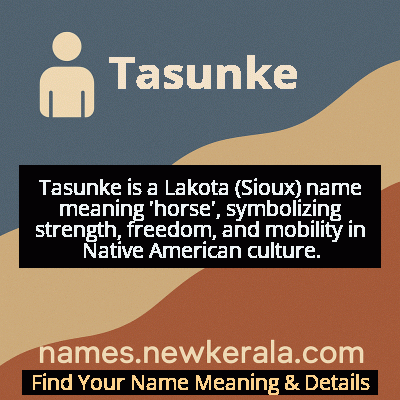Tasunke Name Meaning & Details
Origin, Popularity, Numerology Analysis & Name Meaning of Tasunke
Discover the origin, meaning, and cultural significance of the name TASUNKE. Delve into its historical roots and explore the lasting impact it has had on communities and traditions.
Name
Tasunke
Gender
Male
Origin
American
Lucky Number
1
Meaning of the Name - Tasunke
Tasunke is a Lakota (Sioux) name meaning 'horse', symbolizing strength, freedom, and mobility in Native American culture.
Tasunke - Complete Numerology Analysis
Your Numerology Number
Based on Pythagorean Numerology System
Ruling Planet
Sun
Positive Nature
Leaders, ambitious, highly driven, self-reliant, innovative.
Negative Traits
Overly aggressive, domineering, impatient, selfish.
Lucky Colours
Red, orange, gold.
Lucky Days
Sunday.
Lucky Stones
Ruby, garnet.
Harmony Numbers
2, 3, 9.
Best Suited Professions
Entrepreneurs, managers, engineers.
What People Like About You
Courage, determination, leadership.
Famous People Named Tasunke
Tasunke Witko
Lakota War Leader
Legendary resistance leader at Battle of Little Bighorn
Tasunke Sapa
Lakota Chief
Spiritual leader during transition to reservation life
Tasunke Kokipapi
Lakota Warrior
Noted fighter in Plains Indian Wars
Name Variations & International Equivalents
Click on blue names to explore their detailed meanings. Gray names with will be available soon.
Cultural & Historical Significance
The cultural weight of this name extends beyond practical utility to spiritual significance. In Lakota cosmology, the horse represents sacred power and serves as a messenger between worlds. Naming a child Tasunke was not merely descriptive but aspirational—parents hoped their son would embody the horse's strength, grace, and vital role in community survival. During the resistance period of the 19th century, many leaders with horse-related names became symbols of Indigenous sovereignty and cultural preservation, making Tasunke a name that echoes with historical resilience and cultural pride.
Extended Personality Analysis
Those named Tasunke often develop personalities marked by a unique blend of strength and sensitivity. Growing up with a name meaning 'horse,' they frequently internalize attributes associated with these noble animals—loyalty, endurance, and a strong sense of community. Tasunkes tend to be natural protectors who value family and tradition, yet they also possess an independent spirit that resists confinement. Their approach to challenges typically combines practical problem-solving with deep intuition, much like how horses navigate complex terrain with both instinct and learned behavior.
In social settings, Tasunkes often demonstrate quiet confidence rather than overt dominance. They tend to be observant and thoughtful, speaking when they have something meaningful to contribute. Their leadership style typically emerges through consistent action and reliability rather than forceful assertion. Many develop strong connections to nature and physical activity, finding peace in movement and outdoor spaces. The cultural heritage of their name often inspires a lifelong interest in history, tradition, and preserving meaningful cultural practices, making them bridges between past and present.
Modern Usage & Popularity
In contemporary naming practices, Tasunke maintains its strongest presence within Lakota and Dakota communities as part of cultural preservation efforts. While it doesn't rank on national baby name lists, it represents a growing trend of Indigenous families reclaiming traditional names as acts of cultural affirmation. Outside Native communities, the name occasionally appears among families seeking unique, meaningful names with natural elements and historical depth. The 21st century has seen increased awareness of Indigenous names through media representation, educational initiatives, and social justice movements. However, its usage remains relatively rare, preserving its cultural specificity and preventing it from becoming trendy or commercialized. Modern Tasunkes often benefit from digital communities that help maintain cultural connections and provide resources for understanding their name's deep heritage.
Symbolic & Spiritual Meanings
The symbolic resonance of Tasunke extends far beyond its literal translation. The horse in Lakota tradition represents the sacred intersection of practical necessity and spiritual power—a being that enabled physical survival while connecting people to the divine. Symbolically, Tasunke embodies transformation and adaptation, reflecting how Indigenous cultures integrated new elements while maintaining core values. The name carries connotations of journey and purpose, suggesting one who moves through life with intention and connection to their path. It also represents the ideal balance between freedom and responsibility—horses roam vast distances yet remain connected to their herd, just as individuals maintain their independence while honoring community ties. In a metaphorical sense, Tasunke symbolizes cultural endurance and the ability to carry forward traditions while navigating changing circumstances, making it a name rich with layers of meaning for contemporary times.

